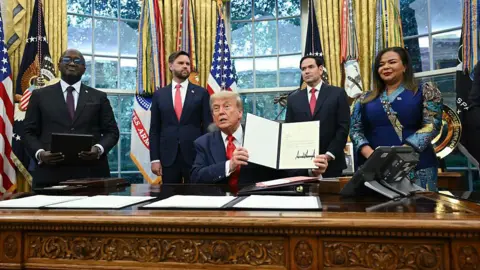DR Congo-Rwanda ceasefire deal still faces many challenges
 Reuters
ReutersBoth sides of the conflict in eastern Democratic Republic of Congo have committed to disarming and disengaging their alleged proxies.
But there are dozens of non-state armed groups active in the region and it's not clear whether all of them will adhere to the ceasefire.
Just hours before the deal was signed, one of them, the Codeco militia, attacked a displaced persons camp in Ituri province, killing 10 people.
Keeping these non-state actors in line will be a tall order. Part of the peace deal involves creating the conditions to allow the hundreds of thousands of people displaced by the conflict to return home.
That won't be possible without a complete cessation of hostilities.
Due to the eastern DRC's vast mineral resources, critical to modern technology including electric car and mobile phone batteries, the economic incentives for rebel groups are incredibly tempting, and this deal does not mention alternatives which may convince these groups to stop fighting over valuable territory. Integrating them into an under-resourced Congolese armed force is unlikely to prove enough of a deterrent.
It's also still not clear what preferential access, if any, the US has been offered to the DRC's minerals.
President Donald Trump has made it clear that this is one of his key incentives for agreeing to support the peace process. But granting the US unfettered access to the country's mineral wealth is unpopular with many in the DRC, upset that the country's resources have failed to provide a better life for its citizens.
DR Congo and Rwanda sign long-awaited peace deal
As to the key questions of whether Rwandan forces will withdraw from eastern DRC, the US position is that once the Hutu-led FDLR, which Rwanda says is backed by the DRC and aims to overthrow the Rwandan government, is dismantled, then Rwanda will also row back on its "defensive measure".
This appears to be an oblique reference to the presence of Rwandan armed forces in eastern DRC.
If the US is able to convince the Rwandans to do this in earnest, it would be a big victory for Washington and Kinshasa.
Rwanda has repeatedly denied its troops are on the ground in eastern DRC, despite credible reports they've actively supported groups like M23 in the region.
More about the DR Congo conflict from the BBC:
- Congolese rebels want peaceful solution to crisis, UN says
- Ex-DR Congo president returns from self-imposed exile, party says
- DR Congo conflict tests China's diplomatic balancing act
- How DR Congo's Tutsis become foreigners in their own country
- 'They took all the women here': Rape survivors recall horror of DR Congo jailbreak
 Getty Images/BBC
Getty Images/BBCGo to BBCAfrica.com for more news from the African continent.
Follow us on Twitter @BBCAfrica, on Facebook at BBC Africa or on Instagram at bbcafrica
